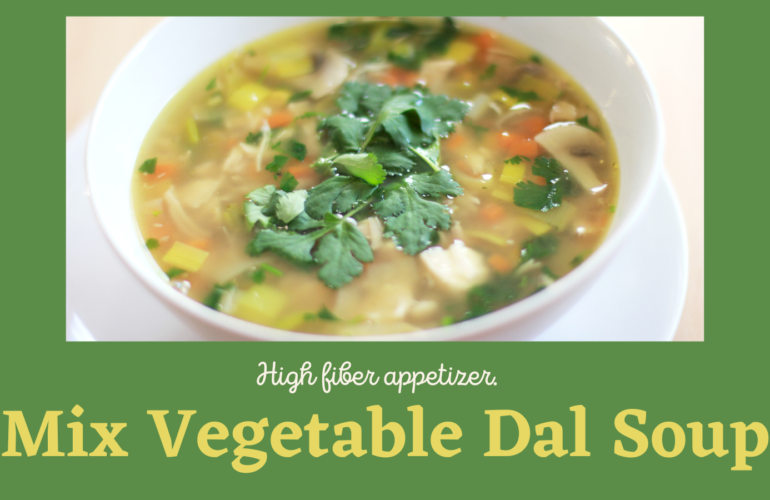Mix vegetable dal soup is a popular staple in Indian cuisine and is also gaining popularity in other parts of the world due to its nutritional benefits and tasty flavor. The ingredients used in this soup may vary according to personal preferences and availability, but the most commonly used vegetables include carrots, tomatoes, onions, spinach, and potatoes.
Mix vegetable dal soup is easy to prepare and can be made in a relatively short amount of time. It is also versatile and can be customized to fit individual preferences by adding or omitting certain ingredients. This soup is an excellent option for those looking for a filling and satisfying meal that is also healthy and nourishing.
In this article, we will discuss the benefits of mix vegetable dal soup, the ingredients used, and a step-by-step guide on how to prepare it.
Ingredients
| Mixed dal | 1 cup |
| Mixed Vegetables | 1 cup |
| Onion | 1 |
| Garlic | 2-3 |
| Ginger | 1 inch |
| Green chilies | 1-2 |
| Cumin seeds | 1 tsp. |
| Coriander powder | 1 tsp. |
| Turmeric powder | 1/2 tsp. |
| Garam masala powder | 1 tsp. |
| Oil | 1 tbsp. |
| Water | 4-5 cups |
| Coriander leaves | For garnish |
Directions
- In a pressure cooker, heat the oil over medium heat. Add cumin seeds and let them crackle.
- Add onions and sauté until they turn translucent.
- Add ginger, garlic, and green chilies. Sauté for a minute.
- Add mixed vegetables and sauté for 2-3 minutes.
- Add coriander powder, turmeric powder, garam masala powder, and salt. Mix well.
- Add the soaked and drained dal and mix well.
- Add 4-5 cups of water and stir well.
- Close the lid of the pressure cooker and pressure cook for 4-5 whistles or until the dal and vegetables are cooked.
- Once the pressure releases naturally, open the lid and give it a stir. If the soup is too thick, you can add some more water.
- Serve hot, garnished with fresh coriander leaves.
Nutritional Information
- Lentils are a great source of plant-based protein, fiber, iron, and other essential nutrients. They also contain folate, magnesium, and potassium, which are important for heart health and can help lower blood pressure.
- Mixed vegetables are packed with vitamins, minerals, and fiber. Carrots are rich in beta-carotene, which is important for eye health, while beans and peas provide plant-based protein and are a good source of folate. Cauliflower is a good source of vitamin C and K, while green beans are rich in vitamin A and C.
- Onions are a good source of vitamin C, fiber, and antioxidants. They also contain sulfur compounds that have anti-inflammatory and antibacterial properties.
- Garlic is rich in sulfur compounds that have been shown to have many health benefits, including reducing inflammation and boosting the immune system. It is also a good source of vitamin C and B6.
- Ginger contains compounds that have anti-inflammatory and antioxidant properties, and may help with digestion and nausea. It is also a good source of vitamin B6 and magnesium.
- Green chilies are rich in vitamin C and contain compounds that may help with digestion and boost metabolism.
- Cumin seeds contain antioxidants and may have anti-inflammatory and anti-cancer properties. They are also a good source of iron and may help with digestion.
- Coriander powder is rich in antioxidants and may have anti-inflammatory and antimicrobial properties. It is also a good source of vitamin C, K, and potassium.
- Turmeric contains a compound called curcumin, which has strong anti-inflammatory and antioxidant properties. It may also help with brain function and lower the risk of heart disease.
- Garam masala is a blend of spices that may contain cumin, coriander, cinnamon, cardamom, cloves, and black pepper. These spices are rich in antioxidants and may have anti-inflammatory properties.
- Oil provides healthy fats that are important for brain and heart health. It also helps the body absorb fat-soluble vitamins, such as vitamins A, D, E, and K.
- Fresh coriander leaves are rich in antioxidants and may have anti-inflammatory and antimicrobial properties. They are also a good source of vitamin C, K, and potassium.
Nutritional Calculations
| Calories | Carbohydrates | Protein | Fat |
| 361 Kcal | 51 gm | 20 gm | 8 gm |
Servings= 9-10 small bowls.
